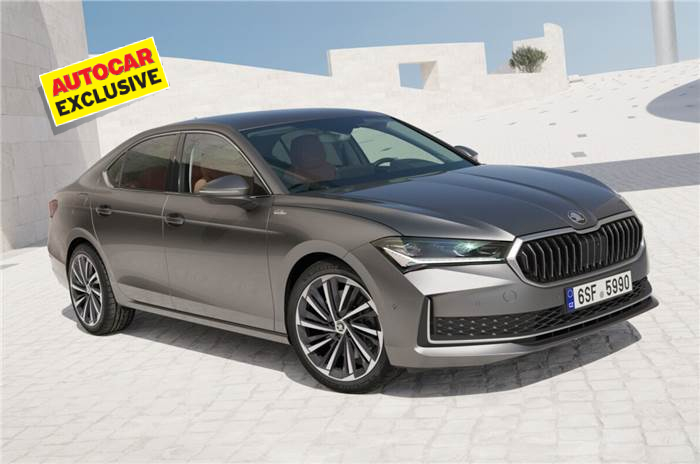Bratislava plant that produces new sedan not geared to make Superb CKD kits for other markets.
The Skoda Superb has recently moved into its fourth modern generation, and while every previous iteration of the premium executive sedan has been sold in India, the new model’s viability for our market is in question.
- Superb production moved to Skoda Bratislava plant
- CBU import duties would push price too high up
- Diesel engine could be brought back via CBU route
The reason behind this is that production for the flagship sedan has moved from the brand’s plant in Kvasiny, Czechia, to the VW Group’s plant in Bratislava, Slovakia, where it will be built alongside its sister car, the Volkswagen Passat. This was done to free up more capacity for production of the Octavia and Skoda’s EVs at Kvasiny.
The reason this has brought the Superb’s India viability into question is that the Bratislava plant doesn’t have a facility to make CKD (Completely Knocked Down) kits of the Superb for other markets, instead only producing complete vehicles for local sale and export. Adding the provision for CKD kits to the plant would come at a great cost, likely made unjustifiable by the waning demand for sedans worldwide.
“There is a new Superb coming but only as a CBU. It will not be an assembly of parts and components because the Bratislava factory, where the Superb, is produced doesn’t have a CKD facility. They can make one if they want but the whole ecosystem will call for too much of an investment just for one market,” explains Petr Janeba, the brand director for Skoda India.
New Skoda Superb: Local Assembly vs CBU Import
Demand for sedans in India is waning too, particularly in the premium executive segment that the Superb shares with only one rival, the Toyota Camry. At its peak in 2010, Skoda sold 4,161 units of the Superb in India, an average of 350 units per month.
In 2022, its last full year of being on sale, the number was down to 1,609 units, or an average of 135 units per month. The locally assembled third-generation sedan went off sale with the introduction of BS6.2 norms last year, and was reintroduced as a CBU import in March 2024.
100 units of the imported Superb were brought in, but sources tell us dealers are struggling to sell them, and until now, less than 40 percent of the allocation has found takers. Apart from low demand for executive sedans in general, the Superb CBU’s price of Rs 54 lakh (ex-showroom) is no doubt to blame, being Rs 16 lakh more than the CKD model, and more expensive than even the Audi A4.
Though it has increased in dimensions, luxury and tech, due to 100 percent import duty, a CBU-imported next-gen Superb would carry an even higher price tag, and thus its feasibility is being questioned.
Imported Skoda Superb presents challenges and opportunities
Though Petr Janeba has officially confirmed that the Superb will be coming as In import, this presents another issue– ADAS. As the active safety tech is now mandated in Europe, a CBU would carry it by default. And, as ADAS has to be calibrated specially for Indian conditions, the car would then have to be homologated for India (CBUs up to 2,500 units can be imported without homologation), which would further drive up the cost.
However, one potential opportunity as an import, is that Skoda could bring the diesel engine back in the Superb, giving it a unique positioning in a segment that’s only petrol and hybrid. There’s still demand for diesel in India, and loyalists miss the VW Group’s TDI engine in particular. Not having to homologate the engine for India would save Skoda a bundle, but even so, a fully imported diesel Superb would likely still prove prohibitively expensive.
Also see:
Skoda Superb long term review, 15,000km report


